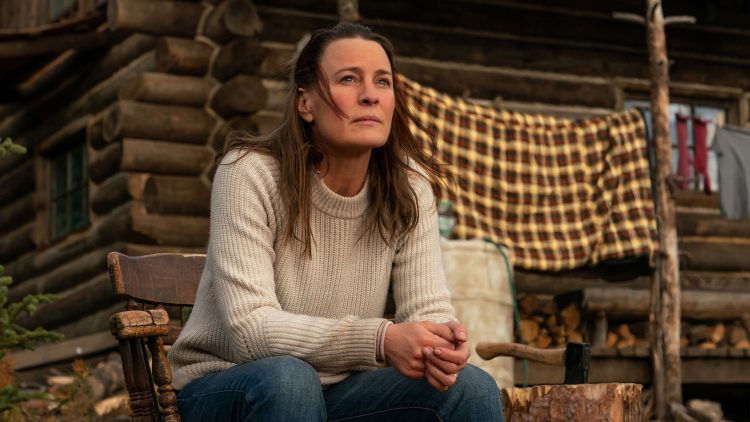Directorial debuts from actors are always interesting for the insight they give into performers and their creative instincts. Robin Wright’s feature-film directorial debut “Land” offers an interesting look into her perspective as a filmmaker and as an actor. In it, Wright directs herself in a survival tale about grief and isolation that’s a sharp swerve from the ways we think about her on screen. “Land” had its world premiere earlier this year at the Sundance Film Festival and in its opening moments introduce us to Edee Mathis (played by Wright), a woman on a mission to unplug from the world. Completely.
We do not know why, although we begin to guess early on, but as Edee heads to the mountains – binning her iPhone to avoid an incoming-call in the early moments – she seems particularly ill-prepared for life in the wilderness. As she retrieves the keys from the isolated cabin, the custodian questions her preparedness, particularly her lack of a vehicle. She shrugs him off, although as she begins to set herself up for the imminent winter, her unplugged, intentional isolation looks less like an idyllic getaway and more like a potential suicide mission. Not quite, but it’s not a completely off reading of what will transpire over the course of the ninety-minute film.
In the film’s first scenes, a brief moment before the wilderness, Edee struggles to explain her state of mind to her therapist. She’s resentful of the people around her who all want her to be magically better. But she cannot be better. And right now, she does not want to be. What she wants is to test her limits. And so, “Land” fashions itself as a survival drama as Edee works through grief. Grief over what? We do not learn until the end of the film, but the specifics of that grief seem incidental especially for the third of the film which features Edee’s increasingly perilous, lonely time in the cabin.

Low on story, but high on landscape photography, this portion of the film is marked by its silence. We need little context to understand Edee, who seems to be held together by pain, ambivalence and grief. The aloneness of her existence is harrowing, and Wright economically and relentlessly centres the exhaustion and punishing nature of that loneliness. That this isolation results in a near-death experience feels inevitable, but the moment comes midway through the film when Edee’s isolation is pierced for the better in the form of Demián Bichir’s Miguel, a local who saves Edee from herself but who is battling his own demons.
From there “Land” turns into a two-person drama as Edee comes to trust Miguel and reconsider her despondency about staying alive. Story-wise, this is very familiar stuff but Wright’s mark as a director is her sincere earnestness for these characters and this story. The screenplay, by Jesse Chatham and Erin Dignam, offers a fairly familiar idea of exploring nature as a way of psychic healing. Depending on your perspective, the story feels like a cousin to survival dramas like “Into the Wild” and or “127 Hours”, recalls tales of turning to the land in the face of grief like “Wild” or the recent “Nomadland” or even a riff on the tale of a well-to-do woman learning about a world unlike her own in a kind of harrowing “Eat Pray Love”.
It’s a familiar centre, even if the ways of developing it can make for starkly different results. “Land”, for example, is notable in rejecting any chance to investigate the psychology of its characters. It’s makes me wonder what drew Wright to the script. The idea, a woman struck by grief rebuilding, is compelling even as the script itself is so minimalist it leaves the audience trying to project our own ideas of the world on to it. It’s solid and an enjoyable watch, but also strangely less affecting than you would consider by the time it heads into its final act.
Yet, that this is the vehicle Wright has chosen for her first feature film feels instructive. She directs herself to an excellent performance – she’s in almost every frame of it – but this is not a vanity outing. The film is quite adamant about being unglamorous, privileging waves of melancholy and quietness that define its aesthetics. I’m curious to see what Wright does next. “Land” might get lost in the shuffle of quiet movies about isolation, but in moments where Bichir and Wright share a knowing look with each other or sit in peaceful silence, it is a film that recognises the need for human connection with a surprising lack of sentiment. It’s a compelling debut feature from Wright the director, and an even better vehicle for Wright the actress.
Land premiered at Sundance Film Festival as part of the premiere section.




